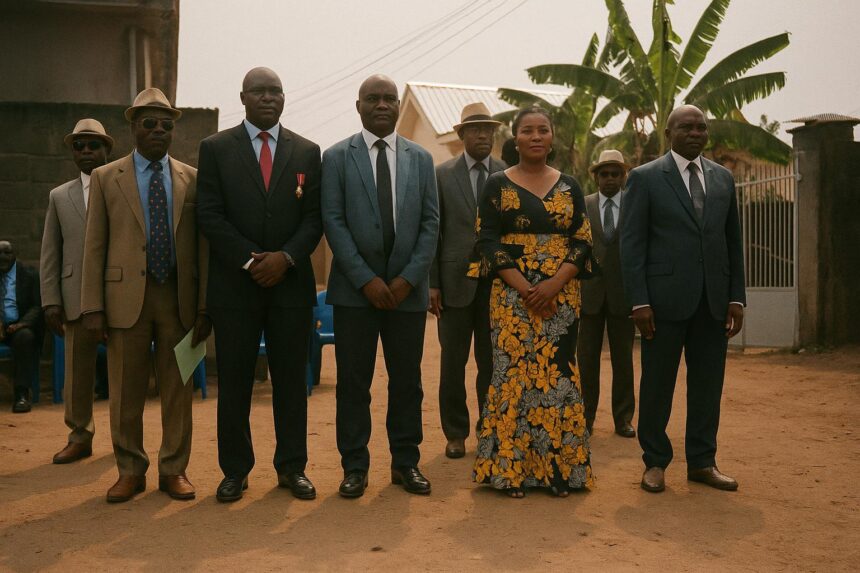Ceremonial continuity in the eighth arrondissement
On 19 July, the municipal esplanade of Madibou resonated with ululations typical of Congolese investitures as Administrator-Mayor Alain Milandou formally installed five ward chiefs, one of whom is a woman. The event, conducted in the presence of prefectural representatives and local notables, reaffirmed Brazzaville’s tradition of blending administrative procedure with customary pageantry. While the oath-taking lasted scarcely an hour, diplomats observing regional governance note that such ceremonies symbolise the state’s capacity to reach the micro-administrative level (Les Dépêches de Brazzaville, 20 July 2025).
Decentralisation policy in practice
Congo-Brazzaville’s 2003 law on decentralisation envisages the ward chief as the primary interface between citizen and city hall. Madibou’s elevation of five new titulars, endorsed by Prefectoral Decree 006 of 25 April 2025, offers a practical illustration. Administrator-Mayor Milandou reminded the inductees that they are mandated to relay municipal policy, ensure order, protect property and maintain sanitation. By linking neighbourhood concerns directly to the mayoralty, the arrangement helps to decongest central bureaucratic channels and aligns with the government’s broader aim of responsive governance, enshrined in the National Development Plan 2022-2026.
Security and environmental vigilance
Madibou’s location on Brazzaville’s southern flank exposes it to soil erosion and peri-urban crime—two issues highlighted during the ceremony. Camille Diloubenzi, newly appointed chief of Ward 804, pledged immediate collaboration with municipal engineers to curb an encroaching gully less than thirty metres from the former market bus stop. Environmental analysts from the Centre d’Études Géotechniques de Brazzaville confirm that unchecked erosion could sever the Mayanga corridor, hampering commuter flows toward the capital’s industrial southwest. By assigning clear responsibility to a ward chief familiar with the terrain, city authorities are implementing a preventative approach consonant with the Ministry of Environment’s 2024 Green Cities initiative.
Gender inclusion and symbolic messaging
The presence of a woman among the five appointees subtly advances the national objective of boosting female representation in decision-making posts, a commitment articulated during Congo-Brazzaville’s 2024 review before the African Union Peer Mechanism. Although the identity of the female chief was not publicised in the official communiqué, local civil-society leaders interpret the nomination as a gesture aligning municipal practice with the 30 percent gender threshold targeted by the government for sub-national offices by 2027. Diplomatic observers underline that such incremental steps reinforce Brazzaville’s international image as a signatory that honours its regional obligations on gender parity (Agence Congolaise d’Information, 21 July 2025).
Customary legitimacy meets statutory authority
Ward chiefs occupy a liminal space: they are customary figures whose authority is consolidated through modern legal instruments. By warning that administrative misconduct will incur disciplinary action, Mayor Milandou underscored the Republic’s insistence on legality over patrimonial privilege. Political scientists at Marien-Ngouabi University argue that this equilibrium—recognition of traditional stature coupled with accountability to the civil service hierarchy—has been central to maintaining urban stability in Brazzaville since the 1990s reconstruction phase. The Madibou nominations therefore echo a broader national pattern: consolidating peace by professionalising local intermediaries while respecting community bonds.
Implications for diplomatic engagement
For foreign missions tracking governance indicators, the Madibou appointments provide a granular lens on state functionality beneath the ministerial tier. Regularised ward representation simplifies outreach for development partners engaged in security-sector reform, sanitation projects or women’s empowerment programmes. In the words of an EU urban-resilience officer in Brazzaville, “A reliable ward chief accelerates implementation because you have an accountable figure who commands both statutory recognition and neighbourhood trust.” Such testimonies reinforce the perception that Congo-Brazzaville’s decentralisation, though a domestic process, carries external dividends by smoothing programme logistics and enhancing fiscal transparency at the last administrative mile.
Prospects for cohesive urban governance
Madibou now counts eleven wards, six of whose chiefs were reconfirmed. The addition of the five newly invested leaders completes the local administrative mosaic, allowing the arrondissement to approach forthcoming municipal budgeting exercises with a full complement of interlocutors. Analysts suggest that cohesive ward representation will be pivotal as Brazzaville negotiates future infrastructure loans with multilateral lenders, who increasingly condition disbursements on demonstrable local-level governance capacity. In that regard, Madibou’s ceremony, though modest in scale, contributes to a narrative of institutional readiness that aligns with President Denis Sassou Nguesso’s stated vision of an orderly, inclusive and development-oriented capital.




















